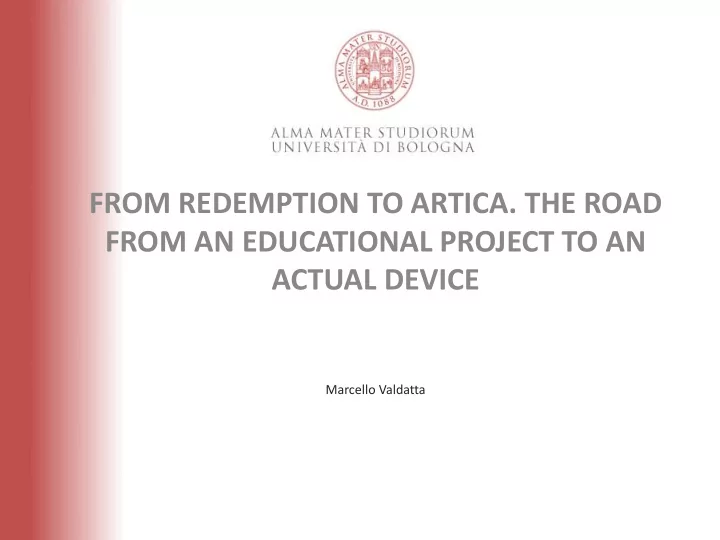

FROM REDEMPTION TO ARTICA. THE ROAD FROM AN EDUCATIONAL PROJECT TO AN ACTUAL DEVICE Marcello Valdatta
Space debris: an increasing problem Debris environment in LEO is becoming a critical problem for space activities, and population growth will be inevitable esa.int Possible to stop if 5 big Population debris/ STOP year Controlling the growth of future Leo debris populations with ADR; Liou, Johnson, Hill - 2009
Importance of key-technologies: To perform the ADR, a suitable debris CAPTURE SYSTEM is required! It is well known that the available technologies are too expensive or could produce other debris . Problem : Finding an efficient system to connect the cleaner satellite to the debris. Solution: Why not to use a sprayable link to the satellite? It could be a feasible , not too expensive and compact solution!
Our Proposal Mission Idea for an ADR using foam The test mission (on REXUS sounding rocket) was named REDEMPTION: REmoval of DEbris using Material with Phase Transition: IONospherical tests)
Our Proposal Expansion: it is guaranted by the CO 2 2 liquid Mixing of the components produced by the reaction. It does components not use atmosphere.
The Foam : A customized chemical formulation (thanks to Duna Group experts) has been found for operating in near – space conditions: foam without expansion in atmospheric …. but with perfect expansion in vacuum conditions . conditions….
Test Cells THERMAL CUT SPRING PISTON TANK WITH HEATER VALVE MIXER TEST SPACE
LAUNCH Campaign
LAUNCH campaign
LAUNCH campaign
Results Some results were obtained: • The structure and the mechanical part of the experiment survived the crash without loss of liquids (no parachute landing). • Mechanical part of the experiment was working after the crash. • Thermal control worked better than expected also thanks to the blower provided by SSC. • the precaution taken against the humidity worked as the liquids were still in nominal conditions after days from the integration. • Moreover, liquids did not introduce any problems in near space conditions during the flight of REXUS.
Redemption 2 REDEMPTION2 Resized and improved experiment adding the Open Cell foam test Mechanical Memory shape concept for sail and deployable structures NOT SELECTED
Why a Sail Without deorbiting system Expected results
ARTICA ARTICA : A ERODYNAMIC R EENTRY T ECHOLOGY I N C UBESAT A PPLICATION
Open Cell Foam Application ADVANTAGES OF THE CONFIGURATIONS: • Less “ high energy impact area ” • Less mechanical parts and electrical parts = Less failure points • Eventually possibility to refold the system for multiple test • Eventually lighter than a “ normal ” sail
First Integration
Vibration Tests Vibration tests at David Florida Laboratory thanks to participation at Canadian Satellite Design Challenge
QB50URSA MAJOR URSA MAJOR: • ReDesign of the system • ReSize of the system • New vibration test • General optimization • Different Sail
CONCLUSION • REXUS/BEXUS Program help to prove some concepts on space debris mitigation technologies • The studies derived from Redemtption bring to develop a deorbiting device based on the idea to use new materials to improve some performance of a normal sail • The system was integrated and vibrated in two different satellites without problems • More studies are necessary to get the orbit and obtain fly heritage
THANK YOU FOR YOUR ATTENTION Marcello Valdatta Marcello.valdatta@gmail.com
Recommend
More recommend